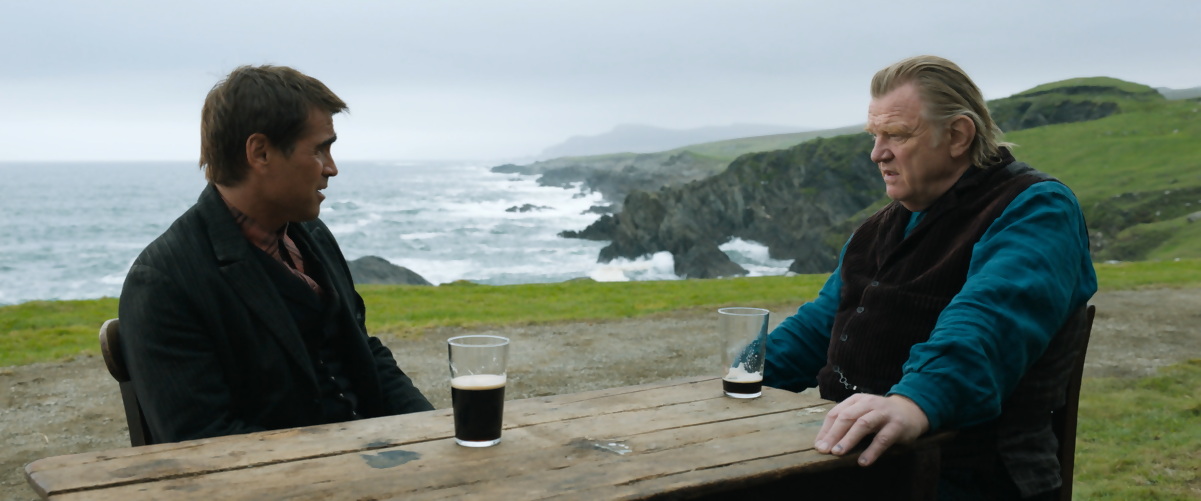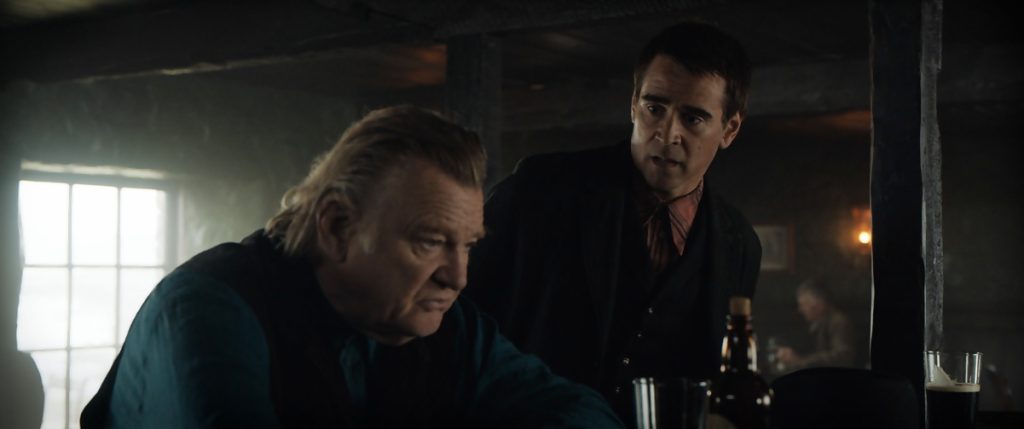
★★★★☆
Colin Farrell has lovely eyes, doesn’t he? The kind of eyes you can stick behind half a pound of prosthetics and still pick them out of a crowd. Eyes you’d trust even after their owner helped kidnap your dog and arrested you for wizard-crimes. Great, big, puppy dog eyes. Unfortunately for Farrell, they’re exactly the kind of eyes that do sad really, really well.
That’s handy for us though, because in playwright-turned-director Martin McDonagh’s latest film, “Colin Farrell’s character looks miserable” must have taken up half the script. It’s a mark of Farrell’s skill as an actor, as well as McDonagh’s filmmaking nous behind the camera, that the result is rarely anything less than compelling—and wickedly funny to boot.
After jetting off across the Atlantic for Seven Psychopaths and Three Billboards Outside Ebbing, Missouri, The Banshees of Inisherin sees McDonagh return to his roots. The year is 1923, towards the tail end of the Irish Civil War, and on the tiny island of Inisherin Farrell’s simple farmer Pádraic wakes to find his old pal Colm (Brendan Gleeson) doesn’t want to talk to him anymore.
From this simple premise stems a masterclass in comic escalation. For much of its runtime, The Banshees of Inisherin is probably the closest McDonagh has come to making an out-and-out comedy, as a delightfully grumpy Colm goes to increasingly drastic lengths to keep his former friend out of his life. While it’s been sold as a two-hander, Banshees is really Farrell’s film. Pádraic is a self-proclaimed cheery fellow, a genuinely nice lad who wants nothing more than to watch his donkey use the toilet and chat about it at the pub. Of course, this only makes Gleeson’s treatment of him funnier. Watching Farrell go through the emotional wringer is like watching a spaniel repeatedly run into a glass door—hilarious at first, then all the sadder when you realise he doesn’t know any other way through.

Colin Farrell and Brendan Gleeson in The Banshees of Inisherin
For his part, Gleeson is perfectly cast as the island’s crotchety old prodigy, a man suddenly more worried with perfecting his fiddling (behave) than the feelings of those around him. Kerry Condon and Barry Keoghan, too, shine as Pádraic’s exasperated sister and village idiot respectively, and both are given just enough material to flesh out the world beyond its central tiff. The whole thing looks beautiful as well, Ben Davis’ cinematography showing off the real-world locales of Inishmore and Achill Island in all their glory.
But while the film may be exceptional from a technical standpoint, the simplicity of the story might be a double-edged sword. From the moment the film’s premise becomes clear about 30 minutes in), though it fulfils its promise down to the letter, it’s difficult to shake the need for the story to turn into something a little more juicy. Although in many ways this simplicity works to the film’s advantage, the ethical complexity of McDonagh’s previous work hangs heavy over a film which seems largely content to re-tread ground covered by others elsewhere.
The Banshees of Inisherin doesn’t have the spiky wit of In Bruges, or the moral knottiness of Three Billboards, but then it doesn’t really try to. Behind the ‘feck off’s and threats of dismemberment lies a gentler, in some ways sadder, film. As an absurd parody of male friendship, it’s an amusing distraction. And though the Civil War parallels may be simple, their timeliness lends the whole experience a poignancy that’s difficult to shake.
The Banshees of Inisherin screens at the BFI London Film Festival on October 13, and opens in UK cinemas on October 21.


